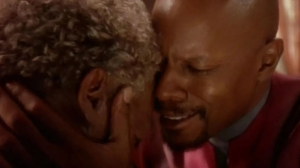When Sin City and Ocean’s Eight star Jaime King took on the role of Detective Ellen Ridgway, a corrupt cop overseeing an underground fight club in the indie movie Lights Out, she wanted to make sure she did the role justice, and that she put some of herself into the character and the script. Police corruption has been in the news in a big way in recent years, but King’s character was different from most of the big, public cases in the real world: her crimes were white collar, and she herself wasn’t lording her physical presence over anyone — or even a gun. Ridgway was the kind of silent, menacing character that you get when you already have power.
Videos by ComicBook.com
All that to say, King told us during a recent interview that she dug into research and talked to law enforcement sources when coming up with a motivation and backstory for Ridgway, who squared off against antiheroes played by Mekhi Phifer and Frank Grillo.
“I am a very hardcore activist and have a very interesting relationship to police and corruption of police,” King told ComicBook.com. “So with this, I really explored, really research, talked to people in the force about what causes corruption and why, specifically with her. Because originally in the script, it didn’t have any real answers, and obviously I need to anchor that in the truth. And the inherent need for her that I had come up with was that, what was explained to me by a particular officer that I really love and trust. He was saying, okay, the only thing that really causes detectives to go corrupt at this point in time is either issues with cartels or they have a drug or alcohol habit. There are very specific things. And I was like, ‘Well, what if someone was dying that you loved?’”
“So, what I did is I made the backstory where it’s her husband and her child, and her husband is dying and she needs this money,” King added. “She needs this money. She needs this money for all the medical, for all of this, for all of that. Because I had to get over my own inherent biases about police corruption and anchor it in something that’s really real and really true as a human being. And so, that was something that was a really interesting thing for me to do and to play, and an important one too. Because anyone can play at a bad guy, but the thing is, that doesn’t work for me. It’s not grounded in reality, it’s not grounded in truth. It is like, everybody does something for a reason, which seems very plain to say, but that’s not, you’ve got to really dive deep.”
Comparing her character to someone like Michael Myers, King noted that she didn’t need to yell or wave guns in order to own a room full of men who are much bigger than she is. Instead, it was her calm demeanor and her lack of fear that sold how dangerous she was.
“I find exploring power is something really fascinating,” King said. “I find it fascinating how people explore power in a day-to-day basis, how that kind of power can be corrupted, how it can be used for good, all of those different things. And so, with this particular character, because I’m a method actor, so I utilize a lot of different tools. But with this one, I chose a particular goddess, Calypso, and I really thought a lot about Calypso, studied a lot about Calypso, and rooted and anchored myself physically in the essences of Calypso, and the idea that that power doesn’t come through speaking loudly or moving too quickly. It’s something that’s measured, right? And also, my intent was that whoever was before me, I would have them feel like they’re the only person in the world that mattered. And definitely encroached on people’s spaces physically within the scene in ways that made them feel like they didn’t know what to do with themselves, which is always exciting when you don’t really, because it’s scary and dangerous to do when you’re in the moment, what it feels like inside of me to do.”
Lights Out is now available to buy or rent on digital platforms.








